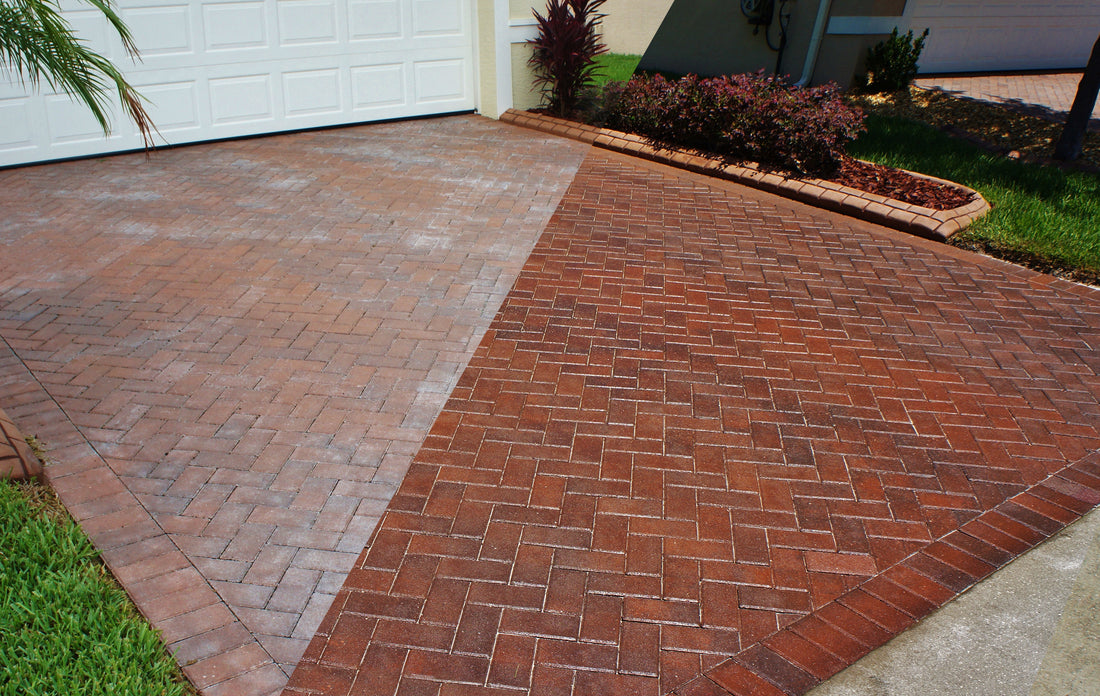
What Is the Best Sealer for My Driveway?
Share
Choosing the right sealer for your driveway is a crucial step in maintaining its durability and appearance. Driveways, while resilient, are constantly exposed to the elements and daily wear and tear, which can lead to issues such as stains, cracks, and discoloration. Factors such as heavy traffic, extreme weather conditions, UV rays, and chemical spills can all affect the surface of your driveway over time.
Sealing your driveway provides a protective barrier that helps to shield it from these damaging factors. It can also rejuvenate an older driveway by hiding imperfections and restoring its visual appeal. For new concrete driveways, sealing helps prevent early damage and discoloration, ensuring that it looks like new for longer.
Different types of sealers offer varying benefits depending on the substrate of your driveway and the desired outcome. From enhancing color to providing a protective shield against water damage and other harsh conditions, the right sealer can make a significant difference. This guide will explore the best options available, including penetrating sealers, topical sealers, and pigmented sealers, and help you determine which one is best suited for your specific needs and driveway type.
Why Should I Seal My Driveway?
Before diving into the types of sealer available, it's important to understand why you might want to seal your driveway in the first place. Driveways, while durable, are prone to staining, cracking, and discoloration over time. Factors like foot traffic, vehicular traffic, extreme weather conditions, UV exposure, and chemical contaminates can take a toll on your driveway's appearance. The right sealer can provide a new lease on life for your driveway, offering protection from traffic and the elements, hiding imperfections, and rejuvenating an already-weathered surface.
Additionally, the right sealer can protect your driveway from water damage, hot tire pick-up, ice melts, and other harsh conditions. This not only extends the life of the driveway but also reduces the need for frequent maintenance. If your driveway is relatively new concrete, sealing it can prevent early damage and discoloration, ensuring that it stays looking new for years to come.
Sealing your driveway can also be an ideal solution for those dealing with porous surfaces or natural stone that might otherwise be prone to damage. Sealers will provide a protective barrier against the elements and wear and tear from vehicles.
What Type of Sealer Should You Choose?
Selecting the proper sealer for your driveway can vary depending on substrate and desired appearance. There are three main types of sealers for driveways: penetrating sealers, topical sealers, and pigmented sealers.
Penetrating Sealers
 Penetrating sealers, as the name suggests, soak into the surface and provide a hydrophobic seal. By repelling water, the surface is also protected from contaminations that may be carried by water and deposited into the surface. Additionally, penetrating sealers can also provide stain resistance. Driveways will typically benefit from having stain resistance due to the harsh chemicals that can leak from a vehicle or be carried from the asphalt to the driveway. Keep in mind that penetrating sealers often are not used to change the natural appearance of the surface. Certain penetrators may enhance the natural color but do not drastically change the existing color.
Penetrating sealers, as the name suggests, soak into the surface and provide a hydrophobic seal. By repelling water, the surface is also protected from contaminations that may be carried by water and deposited into the surface. Additionally, penetrating sealers can also provide stain resistance. Driveways will typically benefit from having stain resistance due to the harsh chemicals that can leak from a vehicle or be carried from the asphalt to the driveway. Keep in mind that penetrating sealers often are not used to change the natural appearance of the surface. Certain penetrators may enhance the natural color but do not drastically change the existing color.Topical Sealers
Topical sealers quite literally provide a clear barrier on top of the surface to protect the surface. These types of sealers are usually available in various levels of gloss – high gloss, matte finishes, and everything in between. Like penetrating sealers, certain topical sealers can provide color enhancement but an inherent transparent appearance. However, it is sometimes possible to add a pigmented additive depending on the specific sealer.
Pigmented Sealers
Pigmented sealers, like Color Seal H₂O, are often referred to as concrete paints or concrete stains. These are generally used for decorative purposes. Pigmented sealers can come in a very wide range of colors and can range from semi-transparent (“stains”) to completely opaque (“paints”) to allow for maximum creativity.- Semi-transparent pigmented sealers can be used to maintain a more natural appearance which allows for the characteristics or the substrate to still be visible. This can be very useful when sealing concrete pavers, stamped concrete, and more.
- Opaque sealers will provide a uniform color across the entire surface. Often these sealers are installed with an integral texturing or on top of an acrylic modified concrete overlay system. Texturing can be very important to provide traction to a surface and reduce the risk of slipping.
Popular Driveway Substrates & Which Sealer Works Best
Driveways can come in many shapes, sizes, and most importantly substrates. Among the most popular substrates are bare concrete, concrete pavers, natural stones and decorative concrete. Knowing your specific substrate will make the decision of which sealer to choose much easier. Keep in mind that the following are suggestions based on years of experience in the industry. If these do not match exactly what you are looking for, an ICT Product Specialist can help determine the proper steps and products to achieve the specific desired outcome.
Bare concrete
A freshly poured concrete driveway can provide a simply elegant aesthetic to your home on its own. In which case, a penetrating sealer is the best option if a visual change is not desired. Water Shield H₂O with Stain Guard is the recommended sealer for this look. Water Shield H₂O is a water-based penetrating water-repellent that will keep the surface from absorbing water and maintain a “dry look” appearance. Excellent stain resistance makes it ideal for protecting against vehicle fluids and contaminants carried by tires.
Concrete pavers

Concrete pavers are an extremely popular substrate for driveways that can require a slightly different approach than other concrete surfaces. There are three major factors to consider when dealing with concrete pavers: sand joint stabilization, color enhancement, and vapor-permeability. To achieve stabilized sand joints, a topical sealer must be used. Concrete pavers are unique in the sense that they are typically much more porous than a concrete slab, therefore some topical sealers can act like or imitate penetrating sealers to get the best of both worlds such as stabilized sand joints and color enhancement while maintaining a natural-looking and vapor-permeable seal. The best sealer to use for concrete pavers is one of our Ure-Seal H₂O products. The Ure-Seal H₂O product line offers several levels of gloss value along with immaculate color enhancement. Ure-Seal H₂O will also stabilize sand joints and eliminate the need for polymeric sand in most scenarios. Vapor-permeability allows moisture to escape to mitigate the chances of hazing or blushing over time. Ure Shades is a semi-transparent pigment additive for Ure-Seal H₂O which can rejuvenate and seal faded pavers in one step.
Decorative concrete
Decorative concrete can be one of many different styles of surfaces typically consisting of a few characteristics: texture (to reduce slipperiness), pigmentation (for aesthetics), and seal (to protect). All decorative concrete starts as bare concrete. Bare concrete is often referred to as a “clean canvas” in the industry. Using different products and application methods can give almost any appearance that you can imagine. This can make things slightly confusing at first but also makes decorative concrete extremely customizable. Spray deck, stamped concrete, and other concrete overlay systems can all fall under the decorative concrete umbrella. Each of these must be approached slightly differently than the others and can be tricky to determine the best products to use. Feel free to reach out to one of the ICT Product Specialists for any additional assistance if you are still unclear on how to tackle your specific job.
- Spray deck, also known as knockdown or cool deck is an extremely popular finish in the decorative concrete spectrum. If your spray deck driveway needs to have the coloring revamped, Color Seal H₂Cool is an ideal option. Color Seal H₂Cool is an opaque pigmented sealer with infrared reflectance to boast a cooler surface temperature. It is especially useful in hotter climates or when using a darker color. It is also recommended to apply a quality topcoat clear sealer to protect Color Seal H₂Cool from vehicular traffic or other high traffic conditions, such as Ure-Seal H₂O. If the coloring of the driveway is up to par, Ure-Seal H₂O would be all that is necessary to protect the surface from daily wear-and-tear

- For stamped concrete driveways, pigmentation is generally approached differently. Semi-transparent pigmented stains are often used to accentuate the inherent variation in texturing. Water Shades is a semi-transparent stain that achieves this appearing slightly darker in the low spots and lighter in the high spots of texture. Again, a quality topcoat, such as Ure-Seal H₂O, is recommended for protection from traffic.
Conclusion: Choosing the Right Sealer for Your Driveway
Selecting the best sealer for your concrete driveway involves careful consideration. There is always the best option in deciding which sealer to use depending on the substrate and desired appearance.
By following the tips and recommendations outlined in this guide, you can give your driveway a fresh look that enhances your home's curb appeal while providing essential protection against wear and tear. Whether you're dealing with a new concrete surface, porous pavers, or an older driveway in need of revitalization, there’s a paint solution that’s right for you. Understanding your square footage, considering the use of concrete sealers, and choosing the best exterior concrete paint for your needs will ensure your project is a success.
